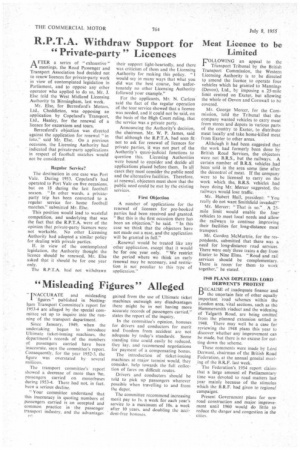R.P.T.A. Withdraw Support for Meat Licence to be "Private-party" Licences
Page 52

If you've noticed an error in this article please click here to report it so we can fix it.
Limited AFIER a series of " exhaustive" meetings, the Road Passenger and Transport Association had decided not to renew licences for private-party work in view of contemplated legislation in Parliament, and to oppose any other operator who applied to do so, Mr. J. Else told the West Midland Licensing Authority 'in Birmingham, last week.
Mr. Else, for Berresford's Motors. Ltd., Cheddleton, was opposing an application by Copeland's Transport. Ltd., Hanley, for the renewal of a licence for excursions and tours.
Berresford's objection was directed against the application for renewal "in ioto.said Mr. Else. On a previous occasion, the Licensing Authority had indicated that private-party applications in respect of football matches would not be considered.
Regular Service?
The destination in one case was Port Vale. During 1953, Copeland's had operated to Port Vale on five occasions. but on 18 during the last football season. "In other words, a privateparty trip has been converted to a regular service for home football matches." submitted Mr. Else.
This position would lead to wasteful competition, and underlying that was the fact that the R.P.T.A. were of the opinion that private-party licences were not workable. No other Licensing Authority had adopted a similar policy for dealing with private parties.
IL in view of the contemplated legislation, the Authority thought the licence should be renewed, Mr. Else asked that it should be for one year only.
The R.P.T.A. had not withdrawn their support light-heartedly, and there was criticism of them and the Licensing Authority for making this policy. "I would say in many ways that what you did was the best course, but unfortunately no other Licensing Authority followed your example."
For the applicants, Mr. N. Carless said the fact of the regular operation of the tour service showed that a licence was needed, and it could not be said, on the basis of the High Court ruling, that the service was a private party.
Announcing the Authority's decision, the chairman, Mr. W. P. James, said that although the R.P.T.A. had seen fit not to ask for renewal of licences for private parties, it was not part of the Authority's quasi-judicial functions to question this. Licensing Authorities were bound to consider and decide all applications placed before them. In all cases they must consider the public need and the alternative facilities. Therefore, at renewal, objectors must show that the public need could be met by the existing services.
First Objection A number of applications for the renewal of licences for pre-booked parties had been received and granted. " But this is the first occasion there has been an objection," he said. "In this case we think that the objectors have not made out a case, and the application will be granted in full."
.Renewal would be treated like any other application, except that it would be for one year only. "We restrict the period where we think an early renewal may be necessary. and restriction is not peculiar to this type of application." FOLLOWING an appeal to the
Transport Tribunal by the British Transport Commission, the Western Licensing Authority is to be directed to amend the licence to operate four vehicles which he granted to Mannings (Devon), Ltd., by imposing a 25-mile limit centred on Exeter, but allowing the whole of Devon and Cornwall to be covered.
Mr. George Mercer, for the Commission, told the Tribunal that the company wanted vehicles to carry meat from stores and depots in various parts of the country to Exeter, to distribute meat locally and take home-killed meat from Exeter to other areas.
Although it had been suggested that the work had formerly been done by British Road Services, the objectors were not B.R.S., but the railways. A certain number of B.R.S. vehicles had been sold in the area some time after the decontrol of meat. If the company were to he licensed to carry on the work which the B.R.S. vehicles had been doing Mr. Mercer suggested. the railways would lose traffic.
Mr. Hubert Hull, president: "You really do not want Smithfield invaded?"
Mr. Mercer: "That is so." A 25mile limit would enable the four vehicles to meet local needs and allow the railways to continue improving their facilities for long-distance meal transport.
Mr. Gordon McMurtrie, for the respondents, submitted that there was a need for long-distance road services. There were only three trains a day from Exeter to Nine Elms. "Road and rail services should be complementary. There is room for them to work together," he stated.
1948 PLANS DEPLETED: LORD DERWENT'S PROTEST ECAUSE of inadequate finance and the uncertain fate of other equally important road schemes within the London area, vital sections, such as the Hammersmith viaduct and the widening of Talgarth Road. are being omitted from the planned extension settled in 1948. There may well be a case for reviewing the 1948 plans this year to discover whether any improvement can be made, but there is no excuse for cutting down the scheme.
These comments were made by Lord Derwent. chairman of the British Road Federation, at the annual general meeting of the B.R..F. last week.
The Federation's, 1954 report claims that a large amount of Parliamentary time was devoted to road matters last year mainly because of the stimulus which the B.R.F. had given to regional campaigns.
Present Government plans for new road construction and major improvement until 1960 would do little to reduce the danger and congestion in the




















































































































